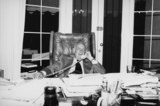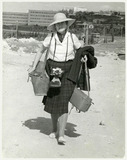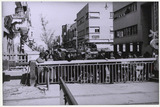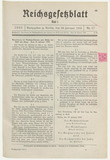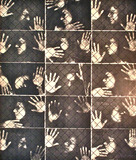Passport
A passport is an official document which determines with certainty the identity, nationality and place of residence of a person. As an identity document it determines who is entitled to live where, when and for how long, and who may enter and leave.
Paul Kohner Agency
In a profile published in 1940, the German-language magazine Aufbau called him a “noble man”. In 1938 Paul Kohner from Austria-Hungary opened an artists' agency on Sunset Boulevard in Hollywood.
Photography
Photographers who were forced to go into exile experienced less difficulty working in their new environment than other visual artists or those whose medium was more closely linked to language, for example. On the one hand, the relatively young photographic medium had developed fewer national characteristics, which simplified the move to other market conditions and recipients.
Places and countries
Artists often have to leave their homeland because those in power consider them to be dangerous or because they belong to a persecuted group. But where can they go to when it is no longer safe for them in their own country? As far away as possible, so that they can work from a safe distance? Or to a neighbouring state, so that they do not lose touch with their colleagues, their public or their professional networks? What impact does such a move have on their artistic work?
Prague
Between 1933 and 1939 the Czech capital attracted a multitude of alienated artists who were forced to leave Germany. Those émigrés discovered in Prague a “solid literary-artistic basis” (Heumos, Czechoslovakia, 1998), a city formed by centuries of coexistence of Czech, Jewish and German cultures.
Press ban
Censorship, that is, the control of information that is to be passed on in either written or spoken form, is an instrument used often in totalitarian states to prevent the dissemination of undesired information. The Nazis also undertook measures to consolidate their power and gain control over all areas of public and private life.
Publishers
When the Nazis staged the book-burnings of 10 May 1933, the sent out an unequivocal message: they would decide in future what the German public should read and what not. Works by Jewish authors or those who were of a different mindset to the Nazis were to belong to the latter category.
Quota refugees
Quota refugees are refugees who are permitted to immigrate to Germany in set numbers on humanitarian grounds or under international law. After they enter the country, they receive a residence permit without having to undergo the asylum procedure; however, they are assigned a place of residence.
Reasons and causes of exile
There are different reasons for going into exile depending on the individual fate, but they are usually related to lack of freedom and human rights, suppression and persecution by state authorities. Most of the people who have to leave their home country have been politically persecuted or have even had their lives threatened by a regime.
Reception of the topic of exile in the arts
In January 2013, French performance artist Gilles Welinski had himself confined in a container for three days in Hamburg’s city centre. Between the hours of 12 p.m. and 8 p.m. he was exposed to the eyes of passers-by, who were able to observe him through spyholes.


